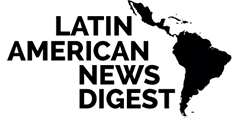Roberto Gómez Bolaños, the Mexican comedian who created, wrote, and played the iconic television characters “El Chavo del Ocho” and “El Chapulín Colorado,” died on November 28, 2014 at the age of 85. Gómez Bolaños got his nickname, derived from the Spanish pronunciation of “Shakespeare” (“Chespir”) with the common diminutive “ito” added to the end,
Read More- Published in Main Story
Since the September 26, 2014 attack on students from the Raúl Isidro Burgos Rural Teachers’ College of Ayotzinapa in Guerrero, in which 6 were killed, 25 were wounded, and another 43 were disappeared in Iguala, the state capital (120 miles south of Mexico City), Mexico has seen massive protests and Mexicans in general have participated
Read More- Published in Main Story
The largest and smallest countries of Spanish and Portuguese speaking Latin America (in terms of population) voted in presidential elections on October 26, 2014. In Brazil the second round confirmed the reelection of President Dilma Rousseff of the leftist PT or Partido dos Trabalhadores (Workers’ Party), while Uruguay’s first round set the stage for what
Read More- Published in Main Story
Presidential Elections in Brazil and Bolivia, and Their Conflicting Implications for the “Pink Tide”
In the weeks before Brazil’s first round of elections on October 5, the smart money seemed to be on a runoff between President Dilma Rousseff of the PT (the Workers Party) and Marina Silva of the Brazilian Socialist Party (PSB), former members of the ruling coalition. It didn’t work out that way. Silva lost steam
Read More- Published in Main Story
On June 30, 2014 Mexican soldiers killed 22 civilians in the municipio of Tlatlaya, in Mexico state. According to the official report, an armed clash erupted when troops patrolling an area near the border with the state of Guerrero came under fire from unknown assailants. Yet that version of events fell apart when a witness
Read More- Published in Main Story
Edwin Chota, an indigenous leader and outspoken Peruvian opponent of illegal logging, was brutally killed in a remote region of the Peruvian Amazon bordering Brazil, along with three other Asháninka community leaders he was traveling with on foot. Chota had received frequent death threats from illegal loggers during years of struggle by his community to
Read More- Published in Main Story
After the death of Brazilian presidential candidate Eduardo Campos in a plane crash on August 13, 2014, his running mate on the Partido Socialista Brasileiro (PSB) ticket, Marina Silva, took over as the official candidate. She is a former minister of the environment and a former senator, who got almost 20 million votes in the
Read More- Published in Main Story
On August 11, 2014 Mexican President Enrique Peña Nieto signed into law new rules governing the historic reordering of Mexico’s state-owned oil, gas and electricity sectors, opening them to levels of participation by foreign and private companies not seen since the 1930s. In 1938 President Lázaro Cárdenas nationalized the Mexican oil industry, taking over from
Read More- Published in Main Story
The July 30, 2014 deadline for Argentina and its hold-out “vulture” creditors to come to an agreement and comply with the order of U.S. Federal Judge Thomas Griesa came and went. In the lead up to the deadline Argentina remained defiant. Argentine Cabinet Chief Jorge Capitanich stayed on message and insisted that the vulture funds
Read More- Published in Main Story
The tens of thousands of children showing up on the United States/Mexico border have generated plenty of interest in the Latin American media. News outlets there have noted U.S. reactions, over reactions, and lack of reaction, the question of “security,” President Obama’s trip to Texas, and the political implications of the crisis. They have explored
Read More- Published in Main Story, Sample Coverage








